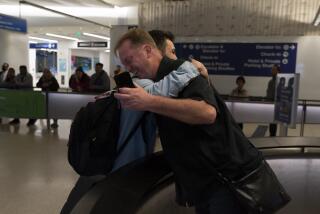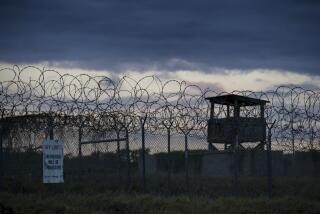Briton Held for 5 Years by Iran Flies Home to Freedom : Release: London views the surprise freeing of Roger Cooper as an effort by Tehran to repair relations with Britain and Western countries.
- Share via
LONDON — Roger Cooper, a Briton imprisoned for more than five years in Iran on a spying charge, flew home to freedom here Tuesday, a day after his surprise release in Tehran.
Wearing a pin-stripe suit and neat tie but looking tired and drawn as he arrived at Heathrow Airport, Cooper said he had spent most of his time in solitary confinement and survived because of his “sheer bloody-mindedness.”
“Anyone like me who has been educated at an English public (private) school and then served in the ranks of the British army is quite at home in a Third World prison,” Cooper told reporters at the airport.
The release of Cooper, 55, had been kept secret. Diplomatic sources here speculated that the reason had to do with internal Iranian politics and that Iranian hard-liners had opposed President Hashemi Rafsanjani’s decision to free the Englishman.
Cooper’s release was seen here as a further effort by the Iranian government to repair relations with Britain and Western countries.
And it fueled further speculation that the Tehran government might use its influence with pro-Iranian Lebanese terrorist groups to release some of the British and American hostages who are being held in Lebanon.
Prime Minister John Major expressed delight at Cooper’s release, saying, “Our thoughts are also with British hostages in Lebanon and their families. We hope they too will be released.”
The former prisoner, who was accompanied by his 28-year-old daughter, Gisu, described some of the mental techniques he used to cope with his imprisonment. “I invented various games and designed intellectual exercises,” he said. “I hope I can patent it because my game, Flick, is brilliant. It’s a sort of cricket played by flicking plum stones across my cell into a receptacle.”
Cooper, who was in Tehran’s Evin Prison during the latter stage of his imprisonment, said he does “not want to be too negative” in characterizing his ordeal. “I was not treated badly. Conditions were not as bad as I had thought. (Evin Prison) was a modern building with good plumbing and adequate food.”
During the time leading up to his release, he said, he sensed a “struggle” among those Iranians who wanted to free him and those who did not.
Fluent in Persian, Cooper first went to Iran in 1958 and lived there with his now-divorced Iranian wife for more than 20 years. He was a speech writer for the late Shah Mohammed Reza Pahlavi, worked for the Financial Times of London in Tehran and also wrote articles there for other British publications.
Cooper was arrested Dec. 7, 1985, while attempting to help an American oil-drilling company, McDermott International, win a business contract.
He was not specifically charged with espionage at first but was held incommunicado for two years. In 1987 he was put on Iranian television with a staged “confession” in which he acknowledged contacts with officials at the British Embassy but did not admit to spying.
“I think, perhaps unfortunately, I match the profile of an English spy,” Cooper said Tuesday. “I had no particular job, and I’d lived there for many years.”
His release, he said, came as a surprise. “I wasn’t actually aware I was being released until about midnight last night. I was in a car and suddenly realized I was on my way to the airport. I asked my captors: ‘What is my status?’ They said: ‘Your sentence is temporarily under suspension.’
“I am very grateful to certain people in the Iranian government who wanted me to go free,” he continued. “I am not sure who they are, but I believe they were close to the office of President Rafsanjani. The Iran which has set me free is not the same as the Iran that arrested me. Today’s Iran is far more humanitarian.”
Cooper’s release was preceded by Britain’s freeing of an Iranian student named Mehrdad Kowkabi, who was accused of bombing a bookstore selling Salman Rushdie’s controversial novel “The Satanic Verses,” which many Muslims have branded sacrilegious. The British Foreign Office denied that Kowkabi was swapped for Cooper.
More to Read
Sign up for Essential California
The most important California stories and recommendations in your inbox every morning.
You may occasionally receive promotional content from the Los Angeles Times.













